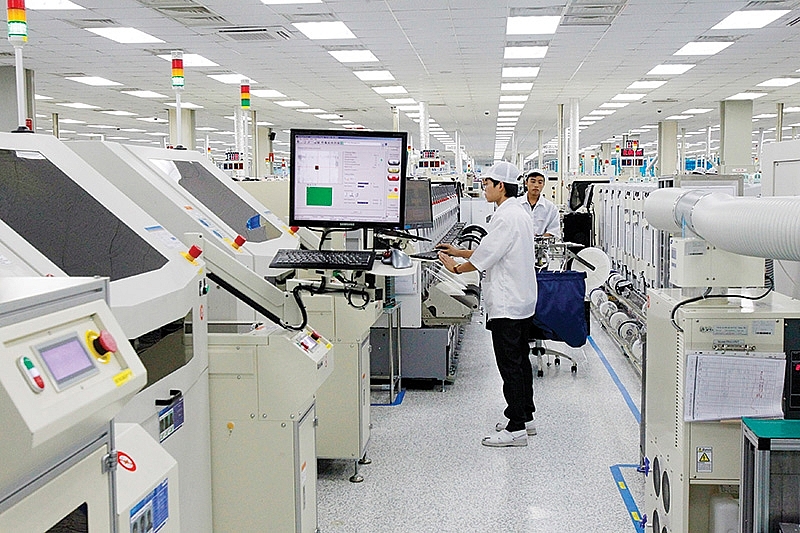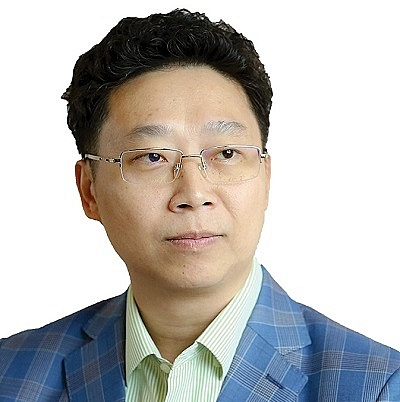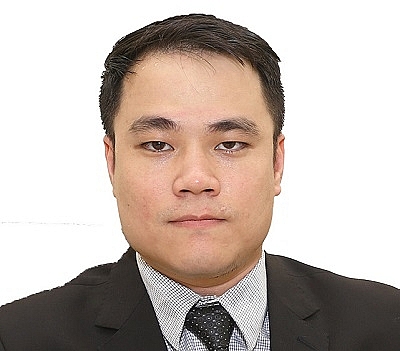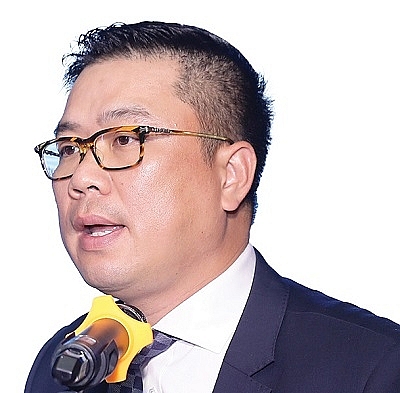FIEs open doors to global supply chain
 |
| Multinational corporations are investing a vast amount in Vietnam in line with its new-generation FDI attraction strategy, Photo: Le Toan |
A number of leading multinational corporations (MNCs) in the automotive, electronics, energy, and household appliance sectors are paying more attention to the acceleration of the linkage process by helping local companies become their suppliers, while enabling existing suppliers to expand their business and share of added value. Such major names include Samsung, Bosch, Canon, Ford, GE, Panasonic, and Toyota.
For example, the high-tech manufacturing base of the US’ GE in the northern port city of Haiphong is planning to increase the localisation rate to 20 per cent, thus bringing in more opportunities for Vietnamese suppliers.
Similarly, Panasonic Vietnam is also among the Japanese enterprises who previously found it hard to choose Vietnamese businesses as suppliers. The firm is trying to improve the situation.
“We are happy to work with local companies which could compete with suppliers from other countries,” said Masahiro Yamamoto, corporate planning director of Panasonic Vietnam. “We expect this programme to help us get business with some potentially long-term partners and promote our local sourcing,” he said.
Panasonic Vietnam and GE Vietnam are among eight MNCs joining the Pilot Supplier Development Programme supported by the International Finance Corporation, a member of the World Bank Group, to support 45 domestic suppliers throughout the value chain in targeted sectors. Through the programme, the MNCs support domestic suppliers in sharing expertise and technology transfer.
In addition, other MNCs like Samsung, which makes up nearly a quarter of Vietnam’s total exports, has announced requirements of around 500 vendors by next year, including 50 Vietnamese Tier-1 vendors.
In the aviation sector, recent investments by the US’ Universal Alloy Corporation Asia Pte., Ltd., South Korea’s Hanwha, Japan’s Mitsubishi Heavy Industries, and other foreign-invested enterprises (FIEs) have reinforced the hope of domestic suppliers to engage in the global supply chain. By boosting high-quality manpower and technology transfer, these MNCs are contributing to helping Vietnam’s aviation sector reach out to the globe.
As further programmes are carried out and more MNCs engage in improving the capacity of supporting industries, more domestic Vietnamese suppliers will benefit, thus helping place the country higher up the global supply chain. The moves will serve long-term future development plans in the country and to align with the new foreign direct investment (FDI) attraction strategy by 2030, which directs the country’s investment incentives towards focusing on the global supply chain, added value, high-tech transfer, research and development, and innovation to ensure sustainable growth.
According to statistics from the Ministry of Planning and Investment, the manufacturing sector retains the most attention among foreign investors in Vietnam. In 2018, the total newly-registered FDI capital in this sector reached $9.06 billion, making up 50.5 per cent of the country’s total newly-pledged FDI.
Vietnam now has 1,800 supporting industry businesses, however, only 300 has managed to join the supply chains of MNCs, according to the Ministry of Industry and Trade. Awakening to the growing demand amidst the enforcement of landmark free trade agreements, domestic Vietnamese suppliers are transforming themselves to improve supply capabilities to meet the requirements of MNCs including quality, price, and delivery, among others. Subsequently, they can be linked to MNCs for future supply opportunities.
To develop supporting industries, with a focus on electronics, automobiles, textiles and garments, footwear, and energy, Vietnam is expected to develop three supporting industry development centres across the country.
Furthermore, Vietnam is also implementing policies to develop supporting industries such as Decree No.111/2015/ND-CP issued in November 2015 stipulating general incentive policies for enterprises operating in supporting industries, or the Law on Support for Small- and Medium-sized Enterprises.
With such moves, by 2020, Vietnam aims to raise the localisation rate to 45 per cent and have around 1,000 domestic enterprises as qualified suppliers for MNCs in the country. The rate is expected to rise to as much as 70 per cent, with 2,000 qualified domestic suppliers.
| Chau Ba Long - General director, Minh Nguyen Support Industry JSC
Minh Nguyen Support Industry is one of the few Tier 1 suppliers of Samsung Vietnam. Thanks to the direct production of key electronic components of smartphones such as 3D glasses, cameras, metal frames, monitors, and batteries, Samsung’s localisation rate has increased to 58 per cent. In addition, many factories including Minh Nguyen also produce many electronic spare parts. Furthermore, we are producing high-quality plastic components and moulds. We provide products for many industries including digital household goods, electronic components, and car parts for some famous brands such as Mitsubishi. As for the biggest obstacles for businesses, the first one would have to be the capital problem. If an enterprise does not have enough capital, it is difficult to access the supply chain because they will have continuous orders. If foreign companies develop, we also have to develop alongside them. If we do not have enough capital, we cannot go on. The second issue is in regard to human resources. Businesses operating across the support industry must have enough manpower with the knowledge and experience to reduce risks of unexpected problems. If the problems affect the quality of products and the working environment, it is certain that our output would also be affected. Nguyen Dinh Quang – Director KNK Vietnam Co., Ltd.
KNK presents new industrial solutions for electronics. We focus on surface mount machinery, precision cleaning chemicals, and industrial consumable products. Our current customers are mostly foreign investors including giant electronics manufacturers Samsung, Panasonic, Microsoft, and Canon, as well as local group Viettel. Vietnam shines as the electronics hub of the region with an influx of investment. It has attracted billions of US dollars in foreign direct investment from global electronics groups. The growth will stimulate more productivity as well as the need for precision from the manufacturers to maintain international standards. We believe that our company can expand further as the electronic industry develops. Pham Anh Duong – Chairman An Phat Holdings
Local enterprises have to improve massively to become vendors for large groups, but more are willing to try as they see massive gains if they succeed. Notably, they will have the opportunity to receive tech transfer and access to global supply chains. Their brands will be famous and they will attract large customers. We had to redouble our efforts to become a vendor of Samsung, with very strict quality requirements. The products of An Trung Industries, which is a subsidiary of An Phat Holdings, satisfy the global standards of Samsung. It also means that An Phat Holdings’ products are of a similar quality to products manufactured in South Korea, Japan, and Europe. In 2018, our company purchased Hanoi Plastic JSC and entered into co-operation with VinFast to establish VinFast-An Phat Ltd. The company also expanded its investment in An Trung Industries. After reviewing the operations of An Phat Holdings in the past year, it is easy to see that the general strategy of the company in supporting industries is investing and expanding operations, and expanding its valuation via becoming a vendor for large groups. |
What the stars mean:
★ Poor ★ ★ Promising ★★★ Good ★★★★ Very good ★★★★★ Exceptional
Related Contents
Latest News
More News
- Kurz Vietnam expands Gia Lai factory (February 27, 2026 | 16:37)
- SK Innovation-led consortium wins $2.3 billion LNG project in Nghe An (February 25, 2026 | 07:56)
- THACO opens $70 million manufacturing complex in Danang (February 25, 2026 | 07:54)
- Phu Quoc International Airport expansion approved to meet rising demand (February 24, 2026 | 10:00)
- Bac Giang International Logistics Centre faces land clearance barrier (February 24, 2026 | 08:00)
- Bright prospects abound in European investment (February 19, 2026 | 20:27)
- Internal strengths attest to commitment to progress (February 19, 2026 | 20:13)
- Vietnam, New Zealand seek level-up in ties (February 19, 2026 | 18:06)
- Untapped potential in relations with Indonesia (February 19, 2026 | 17:56)
- German strengths match Vietnamese aspirations (February 19, 2026 | 17:40)




 Tag:
Tag:



















 Mobile Version
Mobile Version